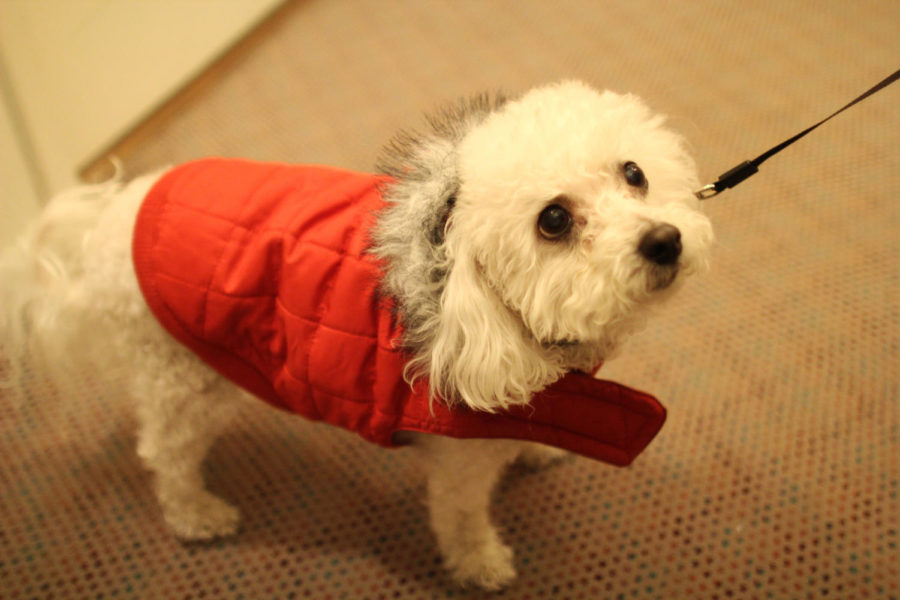ISU vet explains how to keep pets healthy in the winter
Kelby Wingert/Iowa State Daily
Boo, an 11-year-old bichon, wears a parka during the cold winter months. Her owner, Ames resident Kelsey Leonard, likes to keep Boo warm when she goes outside.
December 6, 2013
Coming off of Pet Awareness month in November, it is important for students to be aware of their pet’s health and safety during the cold months of winter. The change of season and its impact on pets certainly depends on the lifestyle of the animal, explained Dr. Susan O’Brien, veterinarian and associate professor of veterinary clinical sciences.
“Getting your pets active during the winter time is important for their overall health and well-being,” O’Brien said.
“Pent-up energy is definitely a problem in the winter. He does the ‘Buddy 500’ at night if he still has too much energy, which is basically Buddy sprinting laps around my living room,” said Luke McCall, junior in pre-business.
McCall said the nice thing about the winter is that when he lets his golden retriever named Buddy out, the cold encourages him to take care of business and get back inside, even though he deals with the cold much better than a human would.
“Much like a husky, retrievers have two coats,” McCall said. “The undercoat insulates the dog to keep him cool in the summer or warm in the winter.”
“Other dogs don’t have this type of protection. There’s nothing wrong with putting a coat on your animal to keep them warm, especially with bitter cold weather conditions of Iowa,” O’Brien said. “Smaller dogs won’t be as acclimated to the cold and may need protection against the elements.”
Icy conditions can also be something to look out for when taking your pet outside, O’Brien said.
“Sometimes, when the ice is rough and sharp, it will cut their feet,” O’Brien said. “Also, chemicals on the road will irritate feet.”
There are different ways to handle pets during the winter depending on their lifestyle and if they are indoor or outdoor pets, O’Brien said.
“Indoor dogs or cats can’t be kept out in the cold at night because their bodies are not used to it, and outdoor animals need more food. Food intake will have to increase if they’re an animal outdoors,” O’Brien said.
Makayla Johnston, sophomore in animal science, said her outdoor cats and indoor cats are a lot different.
“My outdoor cats grow thicker winter coats, and my indoor cat doesn’t,” Jonhston said. “Another is their body condition. The outdoor cats are constantly active, and food isn’t as easily accessible, so they’re in really good shape. My indoor cat has it easier and is a little fatter.”
Being acclimated to their shelter is another crucial factor in a pet’s health during the winter. For example, an outdoor farm cat acclimated to its outdoor environment will be able to sustain living, but an indoor cat thrown outside can be at greater risk, O’Brien said.
“I definitely think pets need shelter because Iowa winters can get really brutal. Not the temperature as much as the wind and snow,” Johnston said. “They grow winter coats so they are fine in cold weather, they just need somewhere to escape winter storms.”

















